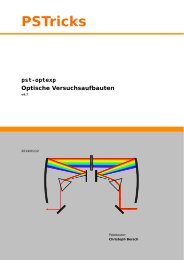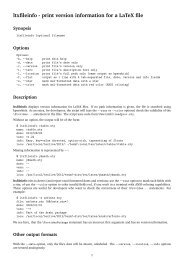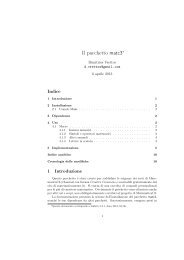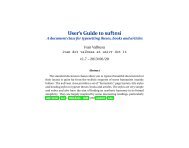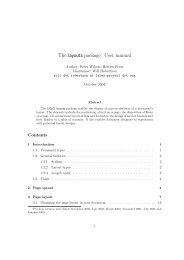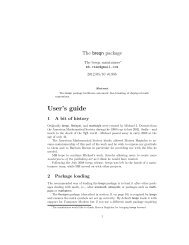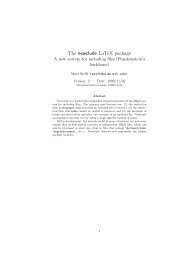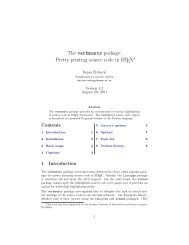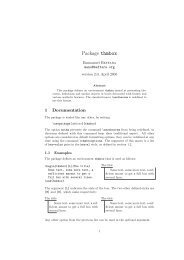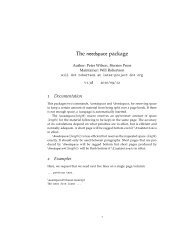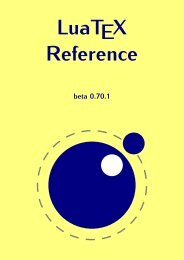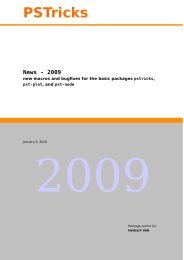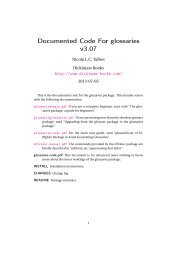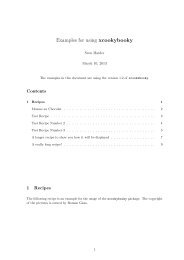The csquotes Package
The csquotes Package
The csquotes Package
You also want an ePaper? Increase the reach of your titles
YUMPU automatically turns print PDFs into web optimized ePapers that Google loves.
\ifterm{〈true〉}{〈false〉}<br />
Expands to 〈true〉 if preceeded by a terminal punctuation mark (period, exclamation<br />
mark, or question mark), and to 〈false〉 otherwise. Note that this test is only<br />
available in the definition of the hooks from § 8.7.<br />
\iftextpunctmark{〈text〉}{〈character〉}{〈true〉}{〈false〉}<br />
Executes 〈true〉 if the 〈text〉 ends with the punctuation mark 〈character〉, and to<br />
〈false〉 otherwise. <strong>The</strong> 〈character〉 may be a period, a comma, a semicolon, a colon,<br />
an exclamation mark, or a question mark. This command is robust.<br />
\iftextpunct{〈text〉}{〈true〉}{〈false〉}<br />
Executes 〈true〉 if the 〈text〉 ends with any punctuation mark, and to 〈false〉 otherwise.<br />
This command is robust.<br />
\iftextterm{〈text〉}{〈true〉}{〈false〉}<br />
Executes 〈true〉 if the 〈text〉 ends with a terminal punctuation mark (period, exclamation<br />
mark, or question mark), and to 〈false〉 otherwise. This command is<br />
robust.<br />
\ifblockquote{〈true〉}{〈false〉}<br />
Expands to 〈true〉 in all block and display quotations, and to 〈false〉 otherwise.<br />
\ifblank{〈string〉}{〈true〉}{〈false〉}<br />
This generic command, which is provided by the etoolbox package, expands to<br />
〈true〉 if the 〈string〉 is blank (empty or spaces), and to 〈false〉 otherwise. This is useful<br />
to test for an empty argument in the definition of the \mk...quote commands.<br />
Note that this test is redundant in the definition of the citation hooks because they<br />
are only executed if there is a citation.<br />
\unspace Removes preceding whitespace, i. e., removes all skips and penalties from the end<br />
of the current horizontal list.<br />
\DeclareAutoPunct{〈characters〉}<br />
8.9 Configuring Punctuation Look-Ahead<br />
This command defines the punctuation marks to be considered by the quotation<br />
commands as they scan ahead for punctuation. Note that 〈characters〉 is an undelimited<br />
list of characters. Valid 〈characters〉 are period, comma, semicolon, colon,<br />
exclamation and question mark. <strong>The</strong> default setting is:<br />
\DeclareAutoPunct{.,;:!?}<br />
This definition is restored automatically whenever the autopunct package option<br />
is set to true. Executing \DeclareAutoPunctuation{} is equivalent to setting<br />
autopunct=false, i. e., it disables this feature.<br />
20



